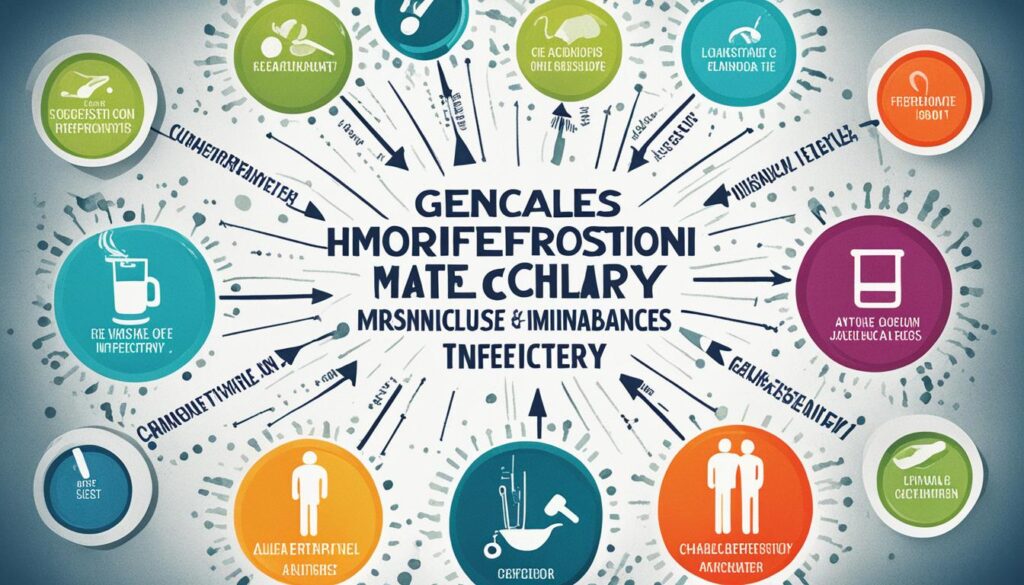Medically reviewed by Dr Chandril Chugh,
Renowned Neurologist and American Trained Specialist
If you and your partner have been struggling to conceive, you are not alone. Male factor infertility, which can be caused by various factors, is a common issue faced by couples trying to start a family. The good news is that there are effective treatment options available to address male infertility and increase your chances of conception.
Table of Contents
ToggleKey Takeaways:
- Male factor infertility can be caused by various factors.
- Effective treatment options are available to help overcome male factor infertility.
- Medical evaluation and guidance are important for determining the best treatment approach for your specific situation.
- Lifestyle changes and home remedies can complement conventional treatment methods.
- Alternative medicine and supplements may have potential benefits in improving sperm quality.
Diagnosing Male Factor Infertility
Diagnosing male factor infertility is an important step towards understanding the underlying causes and identifying suitable treatment options. It typically involves a comprehensive evaluation that includes a general physical examination, medical history assessment, and semen analysis. These initial diagnostic procedures can provide valuable insights into the potential issues affecting male fertility.
General Physical Examination: During the physical examination, your doctor will assess various aspects related to your reproductive health. They may examine your genitals, testicles, and other relevant areas to detect any abnormalities or signs of potential infertility.
Medical History Assessment: Understanding your medical history is crucial in diagnosing male factor infertility. Your doctor will inquire about any previous surgeries, illnesses, or chronic health conditions that may contribute to fertility problems. They may also discuss lifestyle factors such as smoking, alcohol consumption, drug use, and exposure to certain environmental toxins that can impact fertility.
Semen Analysis: A semen analysis is a key diagnostic test for male infertility. It involves collecting a semen sample and analyzing it in a laboratory. The sample is evaluated for various parameters including sperm count, motility (movement), morphology (shape), and other factors that can affect fertility. This analysis provides valuable information about the quality and quantity of sperm, helping to determine if male factor infertility exists and guiding further investigation.
Depending on the findings of the initial evaluation, additional tests may be recommended to identify the specific cause of male infertility. These may include:
- Scrotal Ultrasound: This imaging test uses sound waves to create images of the scrotum, allowing doctors to assess the testicles and surrounding structures. It can help detect abnormalities such as varicoceles (enlarged veins in the scrotum) or blockages that may affect sperm production or transport.
- Hormone Testing: Blood tests may be conducted to evaluate hormone levels, including testosterone, follicle-stimulating hormone (FSH), luteinizing hormone (LH), and prolactin. Hormonal imbalances can contribute to male factor infertility, and these tests can help identify such issues.
- Genetic Tests: Genetic testing may be recommended to identify any inherited genetic abnormalities or chromosomal disorders that can impact male fertility. These tests can provide important insights into the potential genetic causes of infertility, guiding treatment decisions.
By utilizing these diagnostic tools, healthcare providers can gain a better understanding of the factors contributing to male factor infertility. This enables them to formulate personalized treatment plans and increase the chances of achieving successful outcomes.
Treating Male Factor Infertility
When it comes to male factor infertility, there are several treatment options available to address the underlying causes and improve the chances of conception. These treatments can range from surgical interventions to medication and assisted reproductive technologies. By exploring these options, you can take proactive steps towards overcoming male infertility.
Surgical Treatments
In some cases, surgery may be necessary to correct certain conditions contributing to male factor infertility. One common surgical procedure is varicocelectomy, which involves removing enlarged veins in the scrotum that can hinder sperm production. Another surgical option is vasectomy reversal, where a previously performed vasectomy is undone to restore sperm flow. These surgical treatments aim to alleviate structural abnormalities and improve sperm quality.
Medication for Male Infertility
Medication can play a vital role in treating male infertility by addressing specific issues that may be affecting fertility. For example, antibiotics may be prescribed to combat infections in the reproductive system that can impair sperm production. Medications like Cialis or Viagra can help improve erectile dysfunction, enhancing sexual performance and facilitating conception. Hormone therapies can regulate hormonal imbalances that may be responsible for infertility.
Assisted Reproductive Technology (ART)
In cases where other treatment options have not been successful, or in severe cases of male infertility, assisted reproductive technology (ART) can offer hope. ART procedures such as in vitro fertilization (IVF) and intracytoplasmic sperm injection (ICSI) allow for the collection and manipulation of sperm and eggs in a controlled laboratory environment. These techniques can significantly increase the chances of achieving pregnancy for couples struggling with male infertility.
It is important to remember that the most suitable treatment option for male factor infertility may vary depending on the specific underlying causes. Consulting with a healthcare professional specializing in fertility can provide personalized guidance and help determine the most effective treatment plan for your individual situation.

Summary of Treatment Options for Male Factor Infertility
| Treatment Option | Description |
|---|---|
| Surgical Treatments | Varicocelectomy, vasectomy reversal, and other surgical procedures to address structural abnormalities and improve sperm production. |
| Medication | Antibiotics for infections, medications for erectile dysfunction, and hormone therapies to regulate hormonal imbalances. |
| Assisted Reproductive Technology (ART) | In vitro fertilization (IVF), intracytoplasmic sperm injection (ICSI), and other ART procedures to enhance the chances of conception. |
When Treatment Doesn’t Work
In some cases, the journey towards overcoming male infertility may face obstacles, with treatment options yielding unsatisfactory results. Experiencing male infertility treatment failure can be disheartening, but it is important to remember that there are alternatives to explore on your path to parenthood. By considering different avenues, you can still find hope of building a family.
Exploring Alternatives
When conventional treatments prove ineffective, you can consider alternative options to achieve your dream of having a child. Here are two alternatives worth exploring:
- Donor Sperm: Using a donor’s sperm can be a viable solution when male infertility treatment doesn’t work. With the help of advanced techniques like intrauterine insemination (IUI) or in vitro fertilization (IVF), the donor sperm can be utilized to fertilize the partner’s eggs, increasing the chances of pregnancy.
- Adoption: Adoption is another beautiful and fulfilling option to consider when infertility treatments do not yield the desired outcome. Adopting a child provides an opportunity to nurture and love a child as your own, regardless of biological connection.
It’s important to understand that every fertility journey is unique, and what works for one couple may not be the right fit for another. Discussing these alternatives with your partner and consulting a healthcare professional specializing in fertility can provide guidance and support in making informed decisions.
“Sometimes, it’s necessary to explore different paths to achieve the happiness and fulfillment of parenthood.” – Dr. Anjali Sharma, fertility specialist
Remember, you are not alone in this journey. Seek support from family, friends, or support groups that provide a safe space to share your emotions, concerns, and challenges. Connecting with others who have experienced similar struggles can offer solace and valuable advice throughout this process.
While male infertility treatment failure can be disheartening, it is important to remain persistent and explore different options that align with your values and desires. The road may be challenging, but with resilience, open communication, and professional support, you can navigate through this setback and ultimately achieve your dream of becoming parents.

| Alternative | Description |
|---|---|
| Donor Sperm | Using donor sperm for fertilization through techniques like IUI or IVF |
| Adoption | Building a family through the process of adoption |
Lifestyle and Home Remedies for Male Infertility
When it comes to dealing with male infertility, certain lifestyle changes and home remedies can make a significant difference in increasing your chances of achieving pregnancy. By incorporating these changes into your daily routine, you can optimize your fertility and improve your overall reproductive health.
- Timing intercourse during ovulation: Having sex during your partner’s ovulation period can maximize the chances of conception. Ovulation prediction kits or fertility tracking apps can help identify the optimal time.
- Increasing the frequency of sex: Regular sexual activity, preferably every two to three days, can ensure a sufficient supply of healthy sperm and enhance the chances of fertilization.
- Avoiding the use of lubricants: Some lubricants can hinder sperm mobility and reduce their chances of reaching the egg. If needed, consider using fertility-friendly lubricants or try natural alternatives such as canola oil or egg whites.
- Maintaining a healthy lifestyle: Adopting a healthy lifestyle can positively impact your fertility. Aim to eat a balanced diet rich in fruits, vegetables, whole grains, lean proteins, and healthy fats. Regular exercise, stress management techniques, and adequate sleep are also essential.
- Avoiding substances that can impact fertility: Several substances can adversely affect male fertility. To optimize your chances of conception, it is advisable to limit or avoid the use of tobacco, alcohol, recreational drugs, and excessive caffeine.
Implementing these lifestyle changes and home remedies can go a long way in improving male fertility and increasing the likelihood of successful conception. However, it’s important to remember that these measures may not be sufficient for all cases of male infertility. If you’ve been trying for a while without success, it is recommended to seek medical advice from a fertility specialist who can provide personalized guidance based on your specific situation.
Expert Tip
“Lifestyle changes such as maintaining a healthy weight, abstaining from smoking and illegal drugs, reducing stress, and avoiding excessive heat exposure (such as saunas or hot tubs) can significantly improve male fertility. By making these positive changes, you are taking proactive steps towards optimizing your chances of conception.”
– Dr. Rajesh Sharma, Reproductive Endocrinologist
| Home Remedies for Male Infertility | Effectiveness Rating (1-5) |
|---|---|
| Avoiding exposure to environmental toxins | 4 |
| Consuming a diet rich in antioxidants | 3 |
| Engaging in regular exercise | 4 |
| Taking specific vitamin supplements | 3 |
| Using natural fertility-friendly lubricants | 2 |
Note: These ratings are based on expert opinions and limited scientific evidence. It is always recommended to consult with a healthcare professional before starting any home remedies or supplements.

Alternative Medicine for Male Infertility
While traditional medical treatments are widely recognized as effective for male infertility, some individuals may explore alternative medicine options to complement their treatment plan. It is important to note that the evidence supporting the efficacy of alternative treatments for male infertility is limited. However, certain supplements have shown potential benefits in improving sperm count and quality. Although these supplements are widely available, it is essential to consult with a healthcare professional before incorporating them into your routine.
Supplements for Male Infertility
Supplements are one of the most popular alternative treatments for male infertility. These natural ingredients aim to enhance sperm production, improve sperm quality, and optimize overall reproductive health. However, the effectiveness of these supplements may vary between individuals, and it is crucial to use them under professional guidance.
Here are some well-known supplements that have been studied in the context of male infertility:
- Coenzyme Q10: This antioxidant is believed to protect sperm cells from damage caused by oxidative stress, potentially improving their overall quality.
- Folic Acid and Zinc Combination: Folic acid and zinc have been associated with increased sperm count and improved sperm motility, respectively.
- L-carnitine: L-carnitine is thought to improve sperm count and motility by supporting energy production in the sperm cells.
- Selenium: As an essential mineral, selenium plays a role in sperm development and motility, promoting male fertility.
- Vitamin C and Vitamin E: These antioxidants have been suggested to protect sperm against oxidative damage, potentially enhancing their quality and function.
It is worth noting that while these supplements may offer potential benefits, their effectiveness may vary depending on individual circumstances. Additionally, excessive intake of certain vitamins and minerals can have adverse effects on health. Therefore, it is essential to seek professional advice and follow the recommended dosage guidelines when considering supplements for male infertility.
| Supplement | Potential Benefits |
|---|---|
| Coenzyme Q10 | Protects sperm cells from oxidative stress |
| Folic Acid and Zinc Combination | Increases sperm count and improves sperm motility |
| L-carnitine | Enhances sperm count and motility |
| Selenium | Promotes sperm development and motility |
| Vitamin C and Vitamin E | Protects sperm against oxidative damage |
It is important to remember that while alternative treatments may be appealing, they should be used in conjunction with evidence-based medical treatments for male infertility. Consult with your healthcare provider to create a comprehensive treatment plan tailored to your specific needs.

Coping and Support for Male Infertility
Coping with male infertility can be a challenging and emotional journey. It’s important to remember that you are not alone and that there are resources available to help you navigate through this difficult time. Here are some tips and support options to consider:
- Set limits: Understand that there may be limits to what medical treatments can achieve. It is important to be realistic about the outcomes and be prepared for the possibility of alternative paths to parenthood.
- Consider other options: If fertility treatments have not been successful or are not a viable option for you, it may be helpful to explore alternative options such as adoption or using donor sperm. These paths can offer a different route to starting or expanding your family.
- Seek counseling: Infertility can take a toll on your emotional well-being. Consider seeking counseling or therapy to help you process your feelings, manage stress, and develop coping strategies. Talking to a professional can provide the support and guidance you need during this challenging time.
- Join support groups: Connecting with others who are going through similar experiences can be incredibly helpful. Look for support groups dedicated to infertility where you can share your feelings, exchange advice, and find comfort in knowing that you are not alone. Online forums and local support groups can provide a sense of community and invaluable emotional support.
“Infertility is a journey that no one should have to face alone. Seek support from your loved ones, professionals, and others who understand what you’re going through. Together, you can find strength, hope, and the resilience to cope with male infertility.”
Remember, coping with male infertility involves both emotional and practical considerations. Take care of your mental well-being, be open to exploring different paths to parenthood, and lean on the support of others who can provide guidance and understanding.

Preparing for Infertility Evaluation
When it comes to evaluating male infertility, proper preparation is key to ensuring a successful doctor’s appointment. Being aware of pre-appointment restrictions and gathering important information about your medical history will greatly assist your healthcare provider in determining the cause of infertility and designing an appropriate treatment plan.
Here are a few essential steps to help you prepare:
- Review pre-appointment instructions: Before your appointment, make sure to contact your doctor’s office and inquire about any necessary preparations. They may advise you to abstain from sexual activity or provide other specific instructions to follow before your visit.
- Compile your medical history: Take the time to gather all relevant medical records, including any previous fertility evaluations, test results, and reports from other healthcare providers. This will help your doctor gain a comprehensive understanding of your health and identify any potential factors contributing to infertility.
- Be prepared to discuss: During your appointment, your doctor will likely ask questions about your lifestyle, sexual habits, and medical history. Be ready to discuss topics such as past surgeries, chronic illnesses, medication use, and any exposure to environmental toxins or substances that may affect fertility.
- Undergo necessary tests: Depending on your specific situation, your doctor may recommend various tests to pinpoint the cause of male infertility. These tests may include semen analysis, hormone level measurements, genetic tests, or imaging studies. Cooperating with these tests will facilitate accurate diagnosis and guide personalized treatment.
Remember, the more information you provide and the more prepared you are, the better equipped your doctor will be to evaluate your infertility and offer suitable options for treatment. By actively participating in the evaluation process, you are taking an essential step towards understanding and overcoming male infertility.

Next, we’ll delve into the various causes of male infertility and explore treatment options specific to each cause. Understanding the underlying factors is crucial in developing an effective treatment plan tailored to your unique needs. Stay tuned!
Causes of Male Infertility
Male infertility can be attributed to various factors that impact fertility. Understanding these causes can help identify potential issues and guide appropriate treatment options. The main factors affecting male fertility include:
- Problems with hormone production
- Issues in the testicles
- Problems with sperm transport
1. Problems with hormone production: Hormones play a crucial role in sperm production and overall fertility. Disruptions in hormone production in the hypothalamus or pituitary gland can affect the release of hormones involved in sperm production, such as luteinizing hormone (LH) and follicle-stimulating hormone (FSH). Imbalances in these hormones can lead to reduced sperm count and motility.
2. Issues in the testicles: The testicles are responsible for producing and storing sperm. Any abnormalities or conditions that impair this function can result in male infertility. Some potential causes include:
- Varicocele: Enlarged veins in the scrotum that disrupt blood flow and cause heat to build up, affecting sperm production.
- Undescended testicles: Testicles that don’t descend properly into the scrotum during fetal development or early childhood can lead to decreased fertility.
- Tumors or cysts: Testicular tumors or cysts can interfere with sperm production and quality.
- Testosterone deficiency: Insufficient testosterone levels can negatively impact the production of healthy sperm.
3. Problems with sperm transport: After production, sperm must be able to travel from the testicles to mix with semen and be ejaculated during sexual intercourse. Obstructions or blockages along the reproductive tract can prevent the sperm from reaching the semen. This may occur due to:
- Blockages in the epididymis or vas deferens, which are responsible for carrying sperm from the testicles to the urethra.
- Issues with ejaculation, such as retrograde ejaculation where semen enters the bladder instead of being expelled through the penis.
Understanding the causes of male infertility is crucial in determining the appropriate treatment approach. By addressing these underlying factors, medical professionals can help couples increase their chances of successfully conceiving.

Treatment Options for Specific Causes of Male Infertility
When it comes to treating male infertility, the approach may vary depending on the specific cause. Treatment options are tailored to address the underlying factors contributing to infertility, such as hormonal imbalances or blockages in sperm transport.
Treatment for Hormonal Imbalances
If hormonal imbalances are identified as a cause of male infertility, hormone replacement therapy (HRT) may be recommended. HRT involves supplementing or replacing specific hormones to restore hormonal balance and improve sperm production. The specific hormones and dosage will depend on the individual’s hormone levels and medical condition.
Treatment for Blockages in Sperm Transport
Blockages in the sperm transport system can prevent sperm from reaching the semen or ejaculate. Depending on the location and severity of the blockage, different treatment options may be considered:
| Treatment | Description |
|---|---|
| Surgical Intervention | If the blockage is caused by factors such as scar tissue, cysts, or congenital abnormalities, surgical intervention may be performed to remove or bypass the blockage. The specific surgical procedure will depend on the location of the blockage and the individual’s medical condition. |
| Assisted Reproductive Technology (ART) | In cases where surgical intervention is not possible or unsuccessful, assisted reproductive technology (ART) can help overcome the blockage. Techniques such as in vitro fertilization (IVF) or intracytoplasmic sperm injection (ICSI) can be used to collect sperm directly from the testicles or epididymis for fertilization. |
It is important to consult with a fertility specialist or reproductive endocrinologist to determine the most suitable treatment option based on the specific cause of male infertility. They will consider factors such as overall health, age, and fertility goals when recommending the best approach.

Assisted Reproductive Technologies (ART) for Male Infertility
When traditional methods of treating male infertility do not yield desired results, assisted reproductive technologies (ART) offer a ray of hope for couples seeking to conceive. These advanced techniques involve laboratory-based processes that aid in fertilization, increasing the chances of successful pregnancy.
Two commonly used ART procedures for male infertility are in vitro fertilization (IVF) and intracytoplasmic sperm injection (ICSI). Both techniques involve the manipulation and combination of sperm and eggs outside the body, optimizing the chances of successful fertilization and embryo formation for subsequent transfer to the woman’s uterus.
1. In Vitro Fertilization (IVF)
In vitro fertilization (IVF) is a highly effective ART procedure that addresses male infertility by bypassing natural barriers to conception. This technique involves the stimulation of a woman’s ovaries to produce multiple eggs, which are then retrieved and fertilized with sperm in a laboratory dish.
The fertilized eggs, known as embryos, are cultured and monitored for several days to allow for optimal development. Finally, one or more viable embryos are selected and transferred to the woman’s uterus, where they can implant and result in pregnancy.
2. Intracytoplasmic Sperm Injection (ICSI)
Intracytoplasmic sperm injection (ICSI) is another widely used ART procedure for male infertility. ICSI involves the direct injection of a single sperm into the cytoplasm of an egg, bypassing natural fertilization mechanisms.
This technique is particularly beneficial when the male partner has a low sperm count, poor sperm motility, or abnormal sperm morphology. By manually injecting a single sperm into the egg, ICSI maximizes the chances of successful fertilization, even in cases of severe male factor infertility.
In both IVF and ICSI, the laboratory conditions provide an optimal environment for fertilization and early embryo development. These ART procedures can address various causes of male infertility, including impaired sperm production, sperm quality issues, and structural abnormalities of the reproductive system.
| Advantages of ART for Male Infertility | Considerations |
|---|---|
| Increases the chances of successful fertilization and pregnancy | Costly procedure with potential financial implications |
| Allows for the selection of high-quality embryos | Requires commitment and time investment |
| Addresses various causes of male infertility | Emotional and psychological impact of the treatment process |
ART procedures like IVF and ICSI offer hope to couples facing male infertility, providing an alternative path to parenthood. It is vital to consult with fertility specialists to determine the most suitable ART approach based on the specific circumstances and underlying causes of male infertility.
Conclusion
Male factor infertility is a common issue faced by couples trying to conceive. However, with the advancements in medical science and the availability of various treatment options, the chances of overcoming male infertility and achieving parenthood have significantly improved. It is important for couples to seek proper medical evaluation and guidance to determine the best treatment approach for their specific situation.
Diagnosing male factor infertility is the first step towards effective treatment. Through comprehensive tests and examinations, healthcare professionals can identify the underlying causes of infertility and recommend appropriate interventions.
Treatment options for male factor infertility range from surgical procedures to medication and assisted reproductive technologies like in vitro fertilization (IVF). These options offer hope to couples by addressing the specific issues causing male infertility and increasing the chances of successful conception.
In conclusion, male factor infertility is not an insurmountable hurdle on the path to parenthood. With the right diagnosis and appropriate treatment, couples can overcome male infertility and fulfill their dreams of starting a family. By staying informed, consulting with healthcare professionals, and exploring the available options, couples can navigate the challenges of male factor infertility and increase their chances of achieving a successful pregnancy.
FAQ
What are the effective treatment options for male factor infertility?
Treatment options for male factor infertility include surgery to correct issues like varicocele, antibiotic treatment for infections, medications to improve sexual intercourse problems, hormone treatments to regulate hormonal imbalances, and assisted reproductive technology (ART) like in vitro fertilization (IVF) or intracytoplasmic sperm injection (ICSI).
How is male factor infertility diagnosed?
Diagnosis of male factor infertility involves a general physical examination, medical history, and semen analysis. Additional tests such as scrotal ultrasound, hormone testing, and genetic tests may also be recommended to identify the cause of infertility.
What should I do if the male infertility treatment doesn’t work?
In some cases, male infertility treatments may not be successful. In such situations, alternatives like using donor sperm or considering adoption can be explored to achieve parenthood.
Are there any lifestyle changes or home remedies that can improve male fertility?
Making certain lifestyle changes such as increasing the frequency of sex, timing intercourse during ovulation, avoiding the use of lubricants, maintaining a healthy lifestyle, and avoiding substances that can impact fertility can increase the chances of achieving pregnancy.
Are there alternative treatments or supplements that can help improve male fertility?
While there is limited evidence, some alternative treatments like specific supplements (coenzyme Q10, folic acid and zinc combination, L-carnitine, selenium, vitamin C, and vitamin E) may have potential benefits in improving sperm count and quality. However, it is important to consult with a doctor before taking any supplements.
How can I cope with the emotional stress associated with male infertility?
Coping with male infertility can be challenging, and it is important to set limits, consider other options like adoption or donor sperm, and seek counseling or support groups to manage the emotional stress associated with infertility treatment.
What should I do to prepare for a doctor’s appointment to evaluate male infertility?
Preparing for an appointment with a doctor to evaluate male infertility involves being aware of any pre-appointment restrictions and being ready to discuss medical history and undergo necessary tests to determine the cause of infertility.
What are the common causes of male infertility?
Male infertility can be caused by factors such as problems with hormone production in the hypothalamus or pituitary gland, issues in the testicles affecting sperm production, and problems with sperm transport.
What treatment options are available for specific causes of male infertility?
The treatment options for male infertility vary depending on the specific cause. For example, hormonal imbalances may be treated with hormone replacement therapy, while blockages in sperm transport may require surgical interventions or assisted reproductive technology.
How can assisted reproductive technologies help with male infertility?
Assisted reproductive technologies like in vitro fertilization (IVF) and intracytoplasmic sperm injection (ICSI) can offer hope to couples experiencing male infertility by achieving pregnancy through the collection and manipulation of sperm and eggs in a lab setting.
